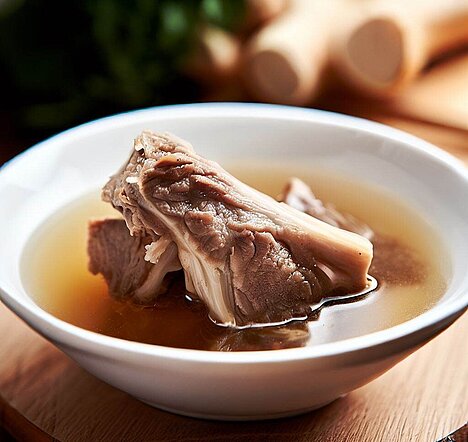Lamb broth

Lamb broth is a liquid made from boiled lamb bones and water. It contains many nutrients that can be healthy for dogs, such as collagen, glucosamine, chondroitin, minerals and trace elements. Lamb broth can be used as a supplement to food or as a treat for dogs. But is lamb broth really as good for dogs as some claim? And are there any risks or side effects? In this article, you'll find out everything you need to know about lamb broth for dogs.
What are the benefits of lamb broth for dogs?
Lamb broth can have several benefits for your dog's health and well-being. Here are some of them:
- Lamb broth can strengthen and protect your dog's joints. This is because lamb broth is rich in collagen, glucosamine and chondroitin. These substances are important components of cartilage and synovial fluid. They can improve the elasticity and lubrication of the joints and reduce inflammation. This can be particularly helpful for older dogs or dogs with osteoarthritis.
- Lamb broth can nourish your dog's skin and coat. The collagen in lamb broth can also strengthen and regenerate your dog's skin. It can increase the moisture and elasticity of the skin and help wounds to heal more quickly. The collagen can also make your dog's coat shinier and smoother.
- Lamb broth can aid your dog's digestion. Lamb broth also contains gelatine, a substance extracted from the connective tissue of bones. Gelatine can soothe and protect the mucous membrane of your dog's gastrointestinal tract. It can also support the intestinal flora and prevent diarrhea or constipation.
- Lamb broth can strengthen your dog's immune system. Lamb broth is a source of minerals and trace elements such as calcium, magnesium, iron, zinc and selenium. These nutrients are important for the functioning of your dog's immune system. They can help to fight off infections and speed up healing.
- Lamb broth can stimulate your dog's appetite. If your dog is sick or doesn't eat much, lamb broth can be a good way to give him some fluids and nutrition. Lamb broth has a pleasant smell and taste that can stimulate your dog's appetite. It is also easy to digest and gentle on the stomach.
What are the disadvantages or risks of lamb broth for dogs?
Lamb broth is not suitable or recommended for every dog. There are some disadvantages or risks that you should be aware of before giving your dog lamb broth. Here are some of them:
- Lamb broth can contain too much salt. If you make lamb broth yourself, you should not add salt or other spices. This is because salt can be harmful to dogs. It can lead to increased blood pressure, heart problems or water intoxication. If you buy ready-made lamb broth, you should make sure that it contains as little salt as possible.
- Lamb broth can contain too much fat. If you make your own lamb stock, you should skim off the fat or allow it to cool and remove it. This is because fat can be difficult for dogs to digest. It can lead to nausea, vomiting or diarrhea. It can also contribute to weight gain or pancreatitis. If you buy ready-made lamb broth, you should make sure that it contains as little fat as possible.
- Lamb broth can cause allergies. If your dog is allergic to lamb or other ingredients in the broth, you should not give him lamb broth. The symptoms of an allergy can include itching, skin rash, swelling or breathing difficulties. If you are not sure whether your dog is allergic or not, you should show him to a vet first.
- Lamb broth can interact with medication. If your dog is taking medication, you should find out beforehand whether or not it is compatible with lamb broth. Some medications can be affected by the nutrients in the broth or lose their effect. For example, blood thinners such as warfarin may become ineffective due to the vitamin K in the broth.
How much and how often should I give my dog lamb broth?
The amount and frequency of lamb broth depends on various factors, such as your dog's age, weight, state of health and feeding schedule. In general, however, the following rule of thumb applies:
- Give your dog no more than 10% of his daily calorie requirement of lamb broth.
- Give your dog no more than 1 teaspoon per 5 kg of body weight of lamb broth per day.
- Do not give your dog lamb broth more than 2 to 3 times a week.
You can give your dog the lamb broth on its own or mix it with its food. Make sure that your dog always has enough fresh water available.
How can I make my own lamb broth for my dog?
If you want to make your own lamb broth for your dog, you only need a few ingredients:
- 1 kg of raw or cooked lamb bones (preferably with some meat on them)
- 4 liters of water
- Optional: some apple cider vinegar (to release the minerals from the bones)
This is how you proceed:
- Put the bones in a large pot and cover them with water.
- Optionally, add some apple cider vinegar (about 2 tablespoons).
- Bring the water to the boil and then reduce to a simmer.
- Check the pot from time to time and remove the foam on the surface.
- Cook the stock for at least 12 hours (the longer the better).
- Strain the stock through a sieve and discard the bones (do not feed to the dog!).
- Skim the fat from the surface or allow the stock to cool and remove the solidified fat.
- Pour the broth into glass containers and store in the fridge (up to 5 days) or freezer (up to 6 months).
Conclusion
Lamb broth can be a healthy and tasty supplement or treat for dogs that can have various benefits for their joints, skin, digestion and immune system. However, lamb broth is not suitable or recommended for every dog and there are some disadvantages or risks that you should be aware of before giving your dog lamb broth, such as salt content, fat content, allergies or drug interactions.
Lamb broth can be beneficial for dogs as it can strengthen joints, nourish the skin and coat, aid digestion, boost the immune system and stimulate the appetite. However, careful attention should be paid to the dosage, as too much salt or fat can be harmful. It is important to use high quality broth without harmful additives and to watch out for allergic reactions or drug interactions. It is recommended not to give more than 10% of the dog's daily calorie requirement in broth and to limit the amount to 1 teaspoon per 5 kg of body weight per day. The frequency should not exceed 2-3 times per week.
If you notice any signs of hypersensitivity or poisoning in your dog, you should see your vet immediately. We are not a substitute for a vet, but we try to be as accurate as possible. Every dog reacts differently and we recommend you get a second opinion or consult your vet if in doubt.
Stay healthy and take good care of your four-legged friend!😊
Similar to Lamb broth
Duck broth is a clear liquid made from cooked duck bones, meat and vegetables. It contains many nutrients such as protein, fat, minerals and vitamins. Duck stock can be used as a base for soups or...
Fish stock can be a healthy and tasty addition to dog food. It contains many nutrients that are important for dogs' health: Protein : fish is a high-quality source of protein, which is needed for...
Chicken broth for dogs is a soup made from chicken meat, bones, vegetables and spices. It is rich in proteins, minerals, vitamins and amino acids that are important for your dog's health. Chicken...
Wild broth has many positive effects on your dog's health. Firstly, it aids digestion by soothing the gastrointestinal mucosa and promoting intestinal flora. Secondly, it strengthens the immune...



